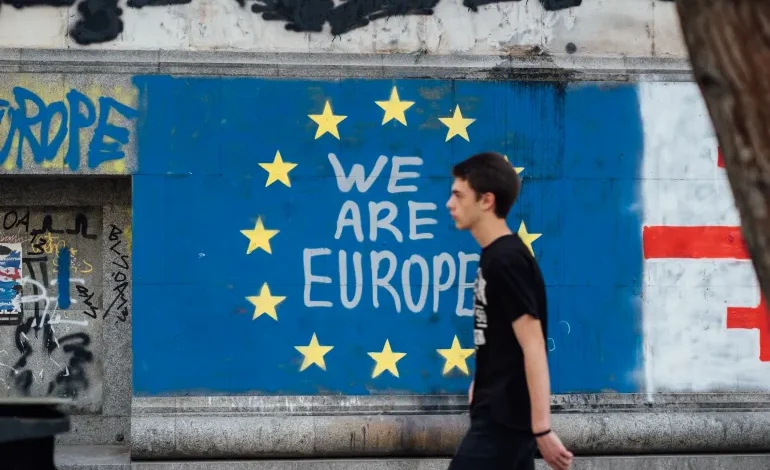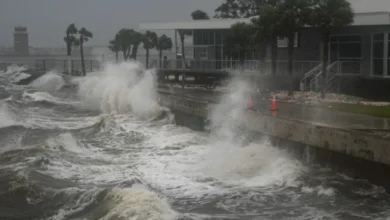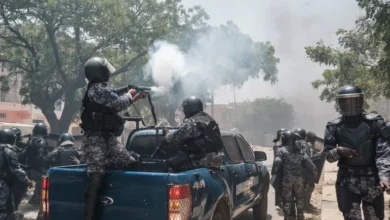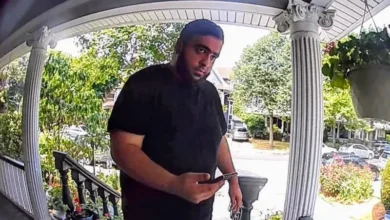Angered by Georgia’s ‘foreign agent’ law, young protesters try new tactic

Beads of sweat gather on Zviad Tsetskhladze’s brow as he shouts into a megaphone, his fist clenched in the air on a sweltering summer’s evening.
“Sakartvelo!” the 19-year-old student from the Black Sea city of Batumi bellows – using the native name of Georgia, before continuing with a series of catchy pro-European Union slogans.
There are thousands of protesters in the crowd, snaking their way around Georgia’s towering parliament building in the capital, Tbilisi.
They repeat his words back to him as rows of neatly regimented, stoney-faced police officers look on.
Since April, Georgia, a small mountainous nation located at the intersection of Asia and Europe famed for its rich cuisine and tradition of hospitality, has been rocked by protests in opposition to a controversial “foreign agents” law.
The bill, which eventually passed in May, requires organisations receiving more than 20 percent of their funding from overseas to register as “agents of foreign influence”.
However, for many young protesters, now is not the time to accept defeat as they continue to heap pressure on Georgian Dream, the governing party seeking to secure a fourth term in power in parliamentary elections scheduled for October 26.
Tsetskhladze, a lead organiser in a student protest group, told Al Jazeera that the bill embodies larger issues for protesters, such as corruption among the governing elites and a political shift away from the EU, to which Georgia gained candidacy status in December.
The country’s ambition to become a full member of the EU is enshrined in its constitution.
Critics say the law resembles Russian legislation, which has been used to crack down on dissent and represents a sudden pro-Russian tilt from the Georgian government.Mariami Svimonishvili, a social policy analyst, said Georgia’s Gen Z – people born between 1997 and 2012 – are determined to signal their opposition to the Georgian Dream, which they see as coming under Russian influence.“Gen Z is very interested in politics; they are very self-aware, very grounded,” she said, placing an English-language novel, Ernest Hemingway’s The Old Man and the Sea, on her lap as protesters swaddled in Georgian and EU flags walked past.
Gen Z is also haunted by memories of the violent five-day conflict in 2008 between Russia and Georgia over the breakaway Abkhazia and South Ossetia regions, she noted, adding more weight to any perceived shift away from Europe towards Russia.
Protesters are now focused on “tiring the government” ahead of elections.
Tsetskhladze said the law represents a “breakdown of democracy” and that he and his fellow students at the national university who had just returned from a strike were planning to start a boycott of Russian products.
The aim, he explained, is to keep building momentum.
A window of opportunity
Davit Metreveli, a 25-year-old tour guide who has been rallying since April, said there is now a “window of opportunity” during which opposition parties can build support, especially among the “European-minded younger generation”, to topple the government.
Metreveli said the Georgian Dream initially appeared to support Georgia’s ambition to join the EU when it was established by billionaire oligarch Bidzina Ivanishvili in 2012.
The Ukrainian flag, whether graffitied on walls or draped across buildings, is ubiquitous in Tbilisi, and Metreveli points to Russia’s invasion of Ukraine as another example of why Georgians should fear the government’s pro-Russian tilt.
Georgia’s government has not supported the West’s sanctions against Moscow over its invasion of Ukraine, and Ivanishvili has failed to publicly condemn the invasion of Ukraine.
Although joining sanctions against a key trading partner in Russia might be “unrealistic”, Metreveli says, Georgia’s governing party’s failure to take a public stance against Russia’s invasion has shown “its true face”.
Although the new law might not appear particularly subversive on paper, Georgians who have lived in the Russian sphere of influence since Georgia’s independence in 1991, after the collapse of the Soviet Union, fear how it will be used.
“If you look at the details, you can see the law will be used to force control of everything,” says Metreveli.
Despite this, many young people will likely remain and work for the organisation, which investigates corruption, including among Georgian government officials, due to its strength and commitment to the antigovernment movement.
Gigauri added that she and her family have faced threats for exposing government corruption. The bill further silences their work.
Viktor Kvitatiani, a lawyer for Transparency International, which provides legal aid to protesters who have been detained, says about 300 people have been arrested, and almost $350,000 in fines have been issued.
Riot police, who have used tear gas and water cannon on protesters, are accused of beating protesters.










